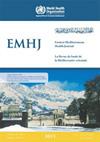突尼斯高中生同时存在成瘾问题的横断面研究
IF 1.9
4区 医学
Q3 HEALTH CARE SCIENCES & SERVICES
引用次数: 0
摘要
背景:成瘾行为是一个重大的公共卫生问题,尤其是在青少年中,他们很容易同时出现多种成瘾行为。目的:评估突尼斯苏塞高中生中成瘾问题的发生率以及成瘾行为(药物滥用、问题视频游戏和社交媒体成瘾)和障碍的共存情况。研究方法:2018 年在突尼斯苏塞市区的公立高中开展了一项横断面研究。采用结构化自填问卷的方式从学生中获取相关信息。使用 SPSS 10 版本进行了统计分析,并计算了 95% 的置信区间。采用卡方检验比较定性变量,并进行多项式回归以确定与成瘾行为共现次数相关的独立因素。研究结果在 1399 名高中生中,60.5% 为女生,平均年龄为 17±2.28 岁。对单一成瘾问题的分析显示,所有烟草制品的成瘾率为 20.9%,酒精成瘾率为 10.1%,所有毒品成瘾率为 7.0%,Facebook成瘾率为 36.1%,电子游戏成瘾率为 35.3%。对并发成瘾问题的分析表明,46.0%的研究人群有 1 种成瘾问题,12.2%的人有 2 种成瘾问题,4.5%的人有 3 种成瘾问题,2.7%的人最多有 4 种成瘾问题。多项式回归结果显示,男生(aOR = 217.004;P < 0.001)、留级生(aOR = 0.232;P < 0.001)、中度或重度抑郁症患者(aOR = 0.232;P < 0.001)、焦虑症患者(aOR = 0.335;P = 0.003)和情感淡漠患者(aOR = 0.361;P = 0.005)同时出现成瘾问题的比例增加。结论突尼斯苏塞青少年的并发成瘾率令人担忧。有问题地使用 Facebook、玩游戏和吸烟是最常见的成瘾行为。突尼斯和中东及北非地区的其他国家迫切需要有效的多部门计划来预防儿童成瘾。本文章由计算机程序翻译,如有差异,请以英文原文为准。
Cross-sectional study of co-occurring addiction problems among high school students in Tunisia
Background: Addictive behaviours are a major public health problem, especially among adolescents, who are susceptible to experiencing multiple co-occurring addictions. Aim: To assess the prevalence of addiction problems and co-occurrences of addictive behaviours (substance abuse, problematic video gaming and social media addiction) and disorders among high school students in Sousse, Tunisia. Methodology: A cross-sectional study was conducted in 2018 in public high schools, in the urban area of Sousse, Tunisia. A structured self-administered questionnaire was used to obtain relevant information from the students. Statistical analysis was performed using SPSS version 10 and confidence intervals of 95% were calculated. Chi-square test was used to compare qualitative variables and multinomial regression was conducted to determine independent factors related to the number of addictive behaviour co-occurrences. Results: Of the 1399 high school students, 60.5% were girls and mean age was 17 ± 2.28 years. Analysis of single addiction problems revealed 20.9% prevalence for all tobacco products, 10.1% for alcohol, 7.0% for all drugs, 36.1% for Facebook, and 35.3% for video games. Analysis of co-occurring addiction problems showed that 46.0% of the study population had 1 addiction problem, 12.2% had 2 addiction problems, 4.5% had 3, and 2.7% had the maximum number of 4 addiction problems. Multinomial regression showed an increase in co-occurrence of addiction problems among boys (aOR = 217.004; P < 0.001), participants who had repeated a school grade (aOR = 0.232; P < 0.001), those who had moderate or severe depression (aOR = 0.232; P < 0.001), and those who were anxious (aOR = 0.335; P = 0.003) and had alexithymia (aOR = 0.361; P = 0.005). Conclusion: The rate of co-occurrent addictions among adolescents in Sousse, Tunisia, is alarming. Problematic use of Facebook, gaming and tobacco use were the most frequent addictive behaviours. There is an urgent need for effective and multisectoral programmes to prevent addictions among children in Tunisia and other countries in the Middle East and North Africa Region.
求助全文
通过发布文献求助,成功后即可免费获取论文全文。
去求助
来源期刊

Eastern Mediterranean Health Journal
HEALTH CARE SCIENCES & SERVICESPUBLIC, ENV-PUBLIC, ENVIRONMENTAL & OCCUPATIONAL HEALTH
CiteScore
3.30
自引率
4.80%
发文量
112
期刊介绍:
The Eastern Mediterranean Health Journal, established in 1995, is the flagship health periodical of the World Health Organization Regional Office for the Eastern Mediterranean.
The mission of the Journal is to contribute to improving health in the Eastern Mediterranean Region by publishing and publicising quality health research and information with emphasis on public health and the strategic health priorities of the Region. It aims to: further public health knowledge, policy, practice and education; support health policy-makers, researchers and practitioners; and enable health professionals to remain informed of developments in public health.
The EMHJ:
-publishes original peer-reviewed research and reviews in all areas of public health of relevance to the Eastern Mediterranean Region
-encourages, in particular, research related to the regional health priorities, namely: health systems strengthening; emergency preparedness and response; communicable diseases; noncommunicable diseases and mental health; reproductive, maternal, child health and nutrition
-provides up-to-date information on public health developments with special reference to the Region.
The Journal addresses all members of the health profession, health educational institutes, as well as governmental and nongovernmental organizations in the area of public health within and outside the Region.
 求助内容:
求助内容: 应助结果提醒方式:
应助结果提醒方式:


